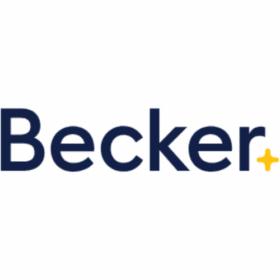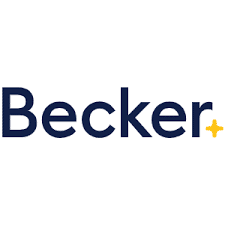
Many accounting students and professionals want to advance their careers and increase their salaries, but they don’t know which certification to choose from CMA vs CPA. Both of these designations will help you earn more money and get promoted, but they have different career paths.
Let’s take a look at some of the unique advantages of both of these certifications and see why some accounting professionals might choose the CMA over CPA certification. I’ll also try to explain some of the major differences between the CMA and CPA.
- 1.Becker CPA Review Course: Rated the #1 Best CPA Review Course of 2026
- 2.Surgent CPA Prep Course: Best Technology
- 3.Gleim CPA Review Course: Largest Question Bank
What is the difference between a CPA and a CMA (Certified Management Accountant?)
What is a CPA?
Both the CPA and CMA credential are obtained by passing an examination but the CPA must also be licensed. If you strive to become a CPA, you will have to have earned 150 credit hours of undergraduate education. After that, you must pass the four-part CPA exam that is administered by the AICPA.
The exam sections include Accounting and Auditing, Business Environment and Concepts, Financial Accounting, Reporting and Regulation, and Regulation. Management-related content is addressed in the Business Environment and Concepts section and to a lesser degree in Financial Accounting, Reporting and Regulation. Before you are eligible to sit for the CPA exam, some states require that you have accrued work experience under the direct supervision of a CPA, which is usually about two years.
[uam_ad id=”15602″]
What is a CMA?
A Certified Management Accountant is exactly as the name implies — an accounting professional who specializes in financial/asset/performance management. The CMA possesses the skills required to make financial decisions for a company. To become a CMA, you need to need to have a bachelor’s degree (preferably in business, accounting or economics) and must become a member of the IMA (Institute of Management Accountants.)
The next requirement is that you have two continuous years of working in some capacity in financial or managerial accounting. (Working while you were going to school can count towards this.) You will then be eligible to sit for the CMA exam which consists of two parts: Financial Reporting, Planning, Performance, and Control and Financial Decision Making.
CPA vs CMA Career Path Differences
While CPAs are equipped for management positions, their skills are not as finely honed as those of the CMA. You can find both CPAs and CMAs at the financial helm in industry, holding such titles as CFO and controller. However, when it comes down to making hard management decisions for a corporation or small business, if you are a CMA, you have the edge. Some examples of job titles for CMAs include risk manager, financial/budget analyst or internal auditor.
CPAs have a wider breadth of training so you will often find them working for the government as well as in the private sector or even as a solo practitioner (although rare these days) performing duties such as auditing or tax preparation. The lines are blurred but in simplistic terms, CMAs manage whereas CPAs provide advice, prepare financial reports and/or make sure that regulations are being complied with.
Get Discounts On CPA Review Courses!

Take $1,600 Off UWorld CPA Elite-Unlimited Course

Get $1,331 Off Becker CPA Pro+

Take $1,330 Off Becker CPA Pro

Enjoy $1,050 Off Gleim CPA Premium Pro Course

Save $1,000 on Becker CPA Concierge

Save $629 Surgent CPA Ultimate Pass

Exclusive Offer – 30% Off Lambers CPA Course Package

Becker Deal: Save on CPA Single Part Courses

Enjoy a 14-day Free Trial on Becker CPA Courses

Becker CPA Advantage Package Now $2,499 – Promo

Becker CPA: Interest-Free Payment Plan – Deal

Get CPA Evolution Ready Content on All Becker CPA Courses – Deal

Take 40% Off Gleim CPA Premium

Save 50% on Gleim CPA Traditional
CMA vs CPA Time Requirement Differences
Be prepared to invest 8-9 years if you plan to become a CPA. First, you’ll need 150 hours of undergraduate credit, which falls somewhere between a bachelor’s and master’s degree. Then, if your state requires work experience, plan on spending another two years or so fulfilling that requirement. Given the extremely low first-time pass rate for the CPA exam, the AICPA allows 18 months. That can add up to 8 ½ years.
| Requirements | CMA | CPA |
|---|---|---|
| Exam | 2-part exam | 4-part exam |
| Average Pass Rates | 35% | 46% |
| Continuing Education | 30hrs per year | 40hrs per year |
| Experience Requirements | 2 years of Financial Management | 1-2 years under Licensed CPA |
In comparison, it also takes about 9 years to become a CMA. You’ll need your bachelor’s degree, which takes 4 years. Next is the 2-year work requirement, which you could realistically complete while you’re still in college. IMA allows exam candidates 3 years to pass the CMA exam — which also has a very low pass rate. Keep in mind that many variables can affect these time estimates, such as how long it takes for you to earn your undergraduate degree, whether you choose to go on to get a master’s to degree to fulfill the 150 hours for the CPA license, how quickly you pass the exam, etc.
| CPA | CMA |
|---|---|
| Financial Accounting & Reporting (FAR) | Part 1: Financial Planning, Performance and Control |
| Audit & Attestation (AUD) | Part 2: Financial Decision-Making |
| Business Environment & Concepts (BEC) | |
| Regulation (REG) |
CPA vs CMA Cost of Certification
There isn’t a specific answer, mainly because a lot of the cost depends on what school you attend for your bachelor’s and/or master’s degree and how long it takes. For exam preparation, there are vendors that provide study materials for both the CPA and CMA exams and those can be expensive – some in the thousand(s)-dollar range. (You can also find free study materials online via blogs, YouTube videos, online communities, etc.)
Taking the CPA exam depends on what state you take it in and the fees vary greatly. You pay for each section of the exam that you sit for as well as a registration fee. You will also have to pay for your CPA license which costs around $150, as well as take CE courses. How many hours you have to take per year will be determined by the state in which you are licensed. On average, it’s about 40 hours a year. Your employer might cover the cost of your CE but don’t count on it.
It’s a little different for the CMA because that exam is administered directly by the IMA and because you aren’t licensed there is no involvement at the state level. Remember that you are required to become a member of the IMA before you get started and annual membership dues are $245 with a one-time processing fee of $15. (The IMA also has other membership plans for students and young professionals.) The cost of the exam itself is a $250 initial fee plus $415 for each part of the exam. This brings the total to $1,340. There is also an annual maintenance fee of $30. As a CMA, you will also have to take CE courses (approximately 30 hours per year.) Again, payment for CE might be an employee benefit where you work.
CPA vs CMA Salaries
Salaries for CPAs and CMAs are fairly comparable with the CPA’s being slightly higher; however, salary classifications tend to become more closely matched with the passage of time. As with any career salary comparison, much will depend on your practice location, your job title as well as years of experience. The average salary for a CMA is $56,590 and $62,123 for a CPA. Both have ample opportunities for career growth and income potential.
If you are either a CPA or CMA, you will earn around $10,000 more per year than your counterparts without these credentials. There is an optimistic outlook for both career paths. Heightened public demand for financial transparency in business and government has increased the need for qualified and ethical financial experts.
| Work Experience | CPA | CMA |
|---|---|---|
| 1-10 years | $60,417 | $59,812 |
| 11-20 years | $85,052 | $93,495 |
| 21-30 years | $108,956 | $118,553 |
| Career High | $119,591 | $128,767 |
CMA vs CPA, Why not have both?
There is no reason why you can’t have both. CPAs will find that additional management training makes them more marketable to the industry. If you are a CMA and your job’s duties involve overseeing your company’s taxes, for example, the additional knowledge gained by becoming a CPA could be beneficial. Likewise, if you need to shore up your auditing or reporting skills.
Not that a lot of careers or jobs will require both of these designations, it’s a huge benefit to have both when pursuing a career in executive level management.
Certified Public Accountant vs Certified Management Accountant – Which Certification is Better?
The real answer to this question is that neither of these certifications is better than the other. They’re both highly respected and used in different carer paths. Basically, if you’re interested in management, strategy/analysis, and decision-making, then becoming a CMA would be a good choice.
However, if you prefer auditing, tax, reporting, and regulation, then the CPA route would be better. If you are looking to become a CPA, you should start by researching what review course you should use to study for the exam. This is the first big step!












